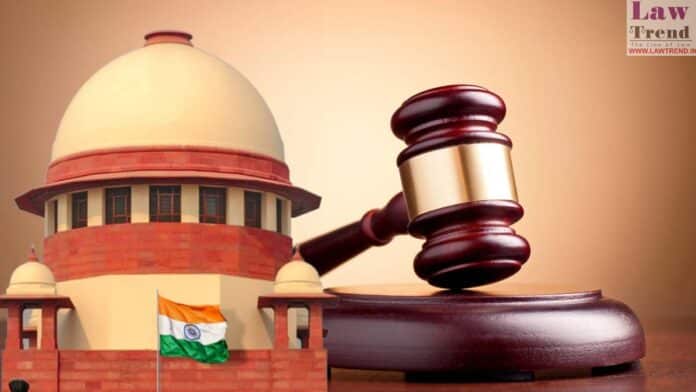The Supreme Court judgement acquitting a West Bengal native of the charge of killing his wife 40 years ago has once again shone a spotlight on the need for compensating a victim of wrongful prosecution for priceless years lost behind bars.
The top court on Friday acquitted Nikhil Chandra Mondal, who was booked for allegedly killing his wife four decades ago, ruling his conviction on the basis of extra-judicial confession cannot be sustained as it is a weak piece of evidence.
The murder was alleged to have taken place on March 11, 1983 in Burdwan district of West Bengal. The trial court decided the case on March 31, 1987 in favour of Mondal, who was acquitted.

The state government’s appeal against the verdict remained pending in Calcutta High Court till December 15, 2008, the day he was convicted and awarded life sentence. Mondal oscillated between hope and despair for over 20 seemingly endless years before landing in a dark and dank prison barrack once again.
Mondal, now aged about 64, was 24 years old at the time of his arrest for allegedly killing his wife, according to his lawyer Rukhsana Chowdhury. Since his arrest after the murder of his wife and following his conviction by the high court in 2008, he has spent more than 14 years behind bars, she said.
Mondal preferred an appeal before the top court in 2010 against his conviction and sentence, which was decided on Friday.
A bench of Justices B R Gavai and Sanjay Karol refused to believe the prosecution’s contention, saying its case rests basically on the extra-judicial confession Mondal allegedly made before his three fellow villagers who were made prosecution witnesses by police.
The bench said the trial court observed while acquitting Mondal that where the prosecution case is entirely based on extra-judicial confession and the prosecution seeks conviction of the accused on that confession, the evidence of the witnesses before whom the alleged confessional statement was made requires greater scrutiny to pass the test of credibility.
It found the trial court’s approach was in accordance with law and set aside the high court’s verdict.
Mondal’s ordeal is not an isolated instance of the prosecution’s case going horribly wrong.
In a number of judgments, the top court has recognised the need for compensation for violation of fundamental rights, including wrongful arrest and incarceration. It has, however, desisted from issuing direction to the Union government to frame guidelines for compensating the victims of unwarranted prosecution.
The apex court had granted a compensation of Rs 50 lakh in 2018 to former ISRO scientist Nambi Narayanan, 24 years after he was falsely implicated in a 1994 espionage case.
In an earlier verdict in 2015, the Supreme Court granted a Rs 10 lakh compensation to forest officer Ram Lakhan Singh who was falsely implicated in vigilance cases.
In the case of Rudal Shah Vs State of Bihar, the apex court had awarded Rs 30,000 as compensation to him and held the scope of article 32 is sufficiently broad to include the power to grant compensation for infringing the fundamental rights.
Article 32 gives the right to individuals to move the Supreme Court to seek justice when they feel they have been unduly deprived of their fundamental rights.
Shah was arrested for his wife’s murder in 1953. He was in jail for 14 years before being acquitted and released in 1982.
Reacting to the apex court’s judgement acquitting Mondal after long years of incarceration, senior lawyer and Constitution expert Rakesh Dwivedi said there should be a law against wrongful prosecution.
“The law has to be made by Parliament and possibly the Supreme Court can push the government to introduce a bill of that kind. That (wrongful prosecution and conviction) impacts personal liberty. Even if some compensation is given, it will not fully reimburse the loss of valuable time in jail. But still something can be done to mitigate (the victim’s suffering) at least,” he said.
Supreme court advocate Ashwani Dubey, who had filed a PIL against wrongful prosecutions, also pitched for a law against wrongful and malicious convictions.
“If wrongful and malicious prosecution is instituted at the behest of the State, then it must be held liable for not bringing out the truth,” he said.
Supreme Court Bar Association president and senior advocate Vikas Singh voiced a divergent opinion, saying there was no need for a fresh law to tackle unfair or unwarranted prosecution and that an affected person can file a suit under existing laws to seek damages.
“There is already a law and you can file a suit for damages if you are wrongfully convicted and prosecuted. I don’t think there is a need for a separate law,” he said.
Last year, the top court had refused to entertain two separate pleas seeking directions to the government to frame guidelines for compensation to victims of wrongful prosecution and to ensure strict action against fake complainants in criminal cases.
It had said the issue involves lawmaking and will create a lot of complications.
The top court had on March 23, 2021 issued notice to the Centre on pleas filed by advocate Ashwini Upadhyay and BJP leader Kapil Mishra.
Mishra had, in his plea filed through advocate Ashwani Kumar Dubey, sought directions to the Centre for framing guidelines to ensure strict action against fake complaints in criminal cases and for compensating the victims of wrongful prosecution.







